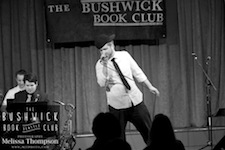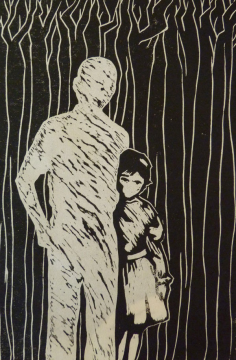Editorials — March 27, 2013 15:57 — 0 Comments
The Monarch Drinks With Matt Watson aka The Bitter Barista aka Spekulation
In the storm of attention following Matt Watson’s launch of the now-infamous “Bitter Barrista†website earlier in 2013, precious little was said about a meaningful fact one thinks would predominate media coverage of the man and his relationship to words: he’s a rapper.
On April 2nd, Watson, known in the Seattle-area musical community as Spekulation, releases a 6-song EP entitled “Truth Be Toldâ€: one-day late for April Fool’s day, but just in time for the rapper to reclaim his reputation from the many things he’s been made out be these last few months. “It’s the same. It’s the exact same thing,†Spekulation tells me at the Seattle jazz club Lucid. “How I think about fitting a 16 into meter, syncopation—the process is the same as sitting to write a tweet. The fact that I’m also a rapper was mostly just a punchline in a lot of the coverage about Bitter Barista.â€
When I ask Spekulation “What happened?â€, he replies, coyly, “I made a website.†That website, bitterbarista.com, broadcasts tweets from “TheBitterBarista†twitter feed, where Spekulation would heckle and harangue pretty much everything about Georgetown coffee shop All City, where he was employed.  It was originally a friend and band member’s idea to start, but in reading the well-worded, grammatically impeccable 140-character capsules of “thoughts from behind the counterâ€, Spek’s love of language shine in often sidesplitting barbs about his customers, his employers, and his own feelings about being the holder of a Philosophy degree from an accredited 4-years institution who works at a coffee shop.
“’What sizes do you have?’ is customer-speak for ‘Do you have anything that’s like twice as big as my head’†proclaims one. “It’s 5:30 in the morning. What exactly did you expect out of this interaction?†bemoans another. Quoting a request made to the coffee shop cashier, one tweet asks “Could I buy a gallon of milk?†On another occasion, a customer demands Spek reset the router because he can’t access wireless internet—from the café across the street.
Not everyone thought the website was funny—namely, All City’s manager, to whom Spek confessed to running bitterbarista.com the night before a story was pubslished about it on well-known coffee-culture review Sprudge.com. Spek’s employment was terminated, and he soon became the subject of a national controversy when his story was picked up by The Seattle Times, then gawker.com, Fox News, and eventually Good Morning America.
“Honestly, right when it happened, I got job offers from a dozen other cafes. Then the national media got involved.†Coffee shops that had just days prior wanted to hire Spekulation as The Bitter Barista to verbally eviscerate their clientele and management suddenly turned their backs. He found himself 30, unemployed, and an internet icon. “I really hope this coffee career takes off so I can finally stop making music,†reads one tweet.
Over Spekulation’s shoulder at this jazz club, a woman is fussily administering numbers to all of the surrounding tables. An aggressive man who I later find out is her husband huffs that we’ll have to move to the bar—the space is reserved for a speed dating session, and all the tables are taken. In the shuffle to relocate, Spek detours for the bathroom, and I pick a seat next to the woman whose company is facilitating the gathering of lonely hearts. “I met my husband through speed-dating! So starting a speed-dating company was literally a labor of love for us,†she tells me. When I ask whether she plays any role in preparing people to succeed on these dates, she replies “There are 18 other people—you’ll talk to everyone of them. So you can’t take it personally. The evening has a way of making sense and coming back around for you. You can’t force it. It’s a cycle.â€
I notice an affable man in a cowboy hat speaking agreeably to Lady Grace, a singer with Native-American ancestry whose band is set to go on stage. I later learn that, in this very moment, he was describing to her how badly he wanted to blow her brains out with the gun he said he had concealed in his jacket. A police report was filed. None of us knew there was a chance the evening could end in tragedy while it was still happening except for Lady Grace who, truth be told, performed as if every song could’ve been her last. The man stays for the whole set and apparently enjoys the music enough to not recycle the hoariest image of American violence: a cowboy killing an Indian in a saloon.
“That actually kind of stings,†says Spek when—unaware of the drama playing itself out at the next table—I bring up how internet commenters on the many stories written about him likened The Bitter Barista’s aggression to the perpetrators of the Columbine, Virginia Tech, and recent Newtown massacres. “I think it delegitimizes the tragedies and just confuses the issues.†If ever there was a context in which Spek’s identity as a rapper would be thoroughly dissected by mainstream media in the context of The Bitter Barista controversy, I thought it would be here—in an exhumation of hip-hop’s linkage, perceived and real, with violent behavior.
But in reviewing the press the rapper Spekulation received in his incarnation as The Bitter Barista, that branch of thought—as well as any other serious look at Spek’s career as an MC— is altogether absent. Spek takes it personally. “To me, honestly,†laughs Spek, “I just took that as evidence of why I needed to step up in the rap game.†He confesses a real anxiety about the coming together of two discordant threads in his life: the fear that, somehow, The Bitter Barista, something of a sideshow, will strangle the life out of Spekulation, the avatar of a craft he’s put real energy into. The white rapper is worried that a tangential extension of that occupation will turn him into a color negative version of himself: infamous for words and wit, but not famous for them; known as a punchline artist, but not respected as one; a Twitter troll who raps, not a rapper.
How it comes around for him is in fact a matter of speculation; but one gets the sense the reckoning will come soon. “Truth Be Told†will be released on spekulationmusic.com on April 2nd, and a live record-release party will follow on April 12th at Lo-Fi. On the record, Spek’s delivery is unceasingly eloquent: the clauses are born with purpose and direction, rise dramatically, fall in smooth inevitability, and die on time. At times he attacks—his voice assumes a sharp intensity; at others, he floats in, above, and around the lush jazz orchestrations that frost his crisp backbeats. On “Hi Hello Yo†his brags are buoyant: he inhales air, and effortlessly exhales reasons why he exhales in a more awesome way than your favorite MC. His lines sing, with critical syllables sustained or clipped to keep the beat’s respect.
Indeed, the music on “Truth Be Told†would be all well and good if it was just music: if Spek simply scatted, he’d have a sense of phraseology that could stand up to any accomplished jazz soloist’s. However, he’s also a poet: meaning, he’s forced to breathe literal meaning into these syncopated syllables. The way his statements and spasms of self-reflection unfurl recall Scarface, and Jay-Z’s earlier frenetic delivery on tracks like “Where I’m From†and “Can I Live?†On “Rememberâ€, Spek—a married man—is a mature narrator of a relationship’s escalation in anxiety, and denouement in forgetfulness. On “All The Soldiersâ€, he wields questions like razor blades, shredding to pieces the cloak of conformity he couldn’t clothe himself in at All City.
There’s a tragic sense in which Spek’s greatest strength on this record—his intensity as a lyricist and an inventive engine of on-the-nose phrases—is in another sense his greatest “weaknessâ€: some of the most moving moments on the record are where he relents to let his impeccable musical surroundings convey some of the meaning of his songs. “Sometimes, you just gotta loop it and let it ride out…â€, he says on Facebook.
One wonders what the next level looks like for him—whether he’ll ever calm his delivery, incorporate more space, and perhaps develop an even more interactive relationship with his equally listenable instrumental surroundings. But if that’s the case, then Spek also deserves credit as a great producer and bandleader. “I produce a piece using samples and my MPC. Nate Omdal comes in and writes live instrumentals, which we record, and then I resample and chop those up again.â€
In an earlier era of hip-hop, east-coast rappers sampled older jazz records as an expression of their resourcefulness as poor, righteous students of music. For Spek, his expansive sense of musical reconstruction is an expression of a different kind of scarcity—the fact that hip-hop is running out of ideas as it nears 40, the same age that other American arts like jazz and cinema began their slow ossification into uninspired classicism and passive historical appreciation. “The live instrumentals came from the fact that a lot of great jazz records have been sampled alreadyâ€, says Spek. “Seattle has a jazz scene that sounds a lot like the records Pete Rock and Q-Tip used to sample.â€
My vague familiarity with this aspect of his musical personality is why I thought it natural to meet him at a jazz club. In an attempt to reclaim the integrity of an interview slowly being lost to loud music, inebriation, and the arrival of mutual friends, I asked about the inspiration behind his record cover, guessing that the artwork was in a sense a sample of De La Soul and A Tribe Called Quest. “It means a lot to me that me that you were able to pick that out,†says Spek. “Especially since the first time we met, you were reading the liner notes to Midnight Marauders. Seems fitting…I like full circles.â€
The answer isn't poetry, but rather language
- Richard Kenney




